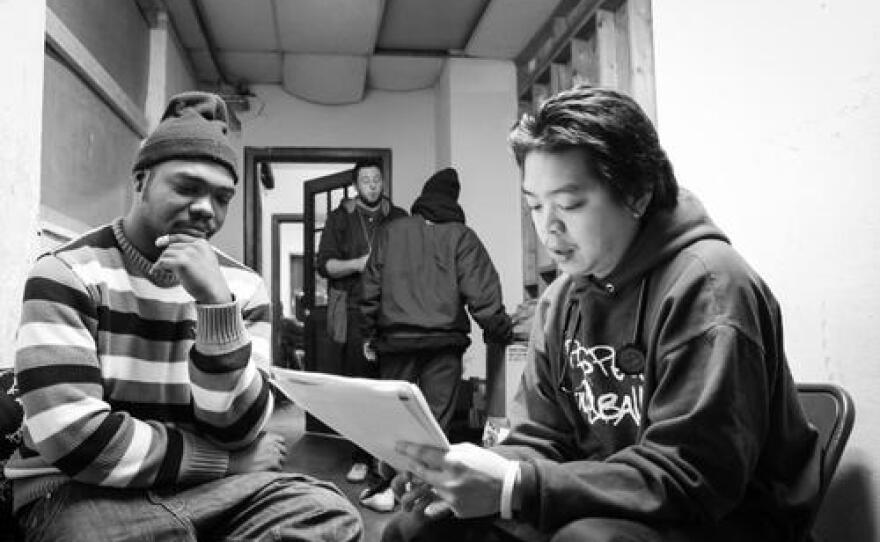Several Wayne State University students started Street Medicine Detroit in May.
They’d heard about a similar program in Pittsburg and they were inspired. They partnered with a Detroit non-profit called Neighborhood Service Organization and together they created a mobile medical clinic.
Philip Ramsey is a community outreach specialist with NSO. (Rumor has it that if you’re trying to locate a specific homeless person, and you give Ramsey the vaguest of details, he can go out and find that person who might be living in a tent next to highway.)
It’s Ramsey’s job to drive the med team around the streets and back-alleys of Detroit and to help them locate homeless people who are in need of medical services.
So once a week, the van rumbles down Michigan Avenue past prostitutes on the corners and a young man pushing a baby stroller. Ramsey helps the team find people who are lying down on the ground or sitting on the curb. He says additional clues that someone may be homeless are people with dirty clothes and uncombed hair, or people who are openly drinking.
The van pulls up to a liquor store and drives to the back near the dumpster, where two men and one woman sit on the curb. They live in a tent behind the store. I-94 is a stone’s throw from their home.
Several Wayne State University medical students pop out of the van, along with their leader, Dean Carpenter. He’s a nurse practitioner at the Tumaini Center, a homeless center run by NSO.
The medical team greets Mr. Harris—a homeless man who asked that I only use his last name. The team has seen Harris several times in the field, and they’re treating him for a urinary tract infection. Carpenter asks Harris how he’s doing after taking an antibiotic.
Carpenter turns to his students and fills them in on Harris’s medical history, which includes heavy drinking.
“So I think his liver is starting to get some damage,” Carpenter tells the students, who scrawl notes on their clipboards. Then Carpenter turns to Harris. “Yeah, your liver’s taking a hit.” Harris seems to quietly take in this information while nodding his head.
Carpenter tells Harris they need to get him into housing before winter and think about getting him treatment.
The team deals with three big health issues in this particular homeless population, a group known as “the service-resistant.” The first is a problem with their physical health, the second is severe mental illness, and the third is substance abuse.
If a homeless person has all three of these things—or what the medical team calls the “trifecta”—it puts a homeless person at risk of dying, sooner rather than later, especially during the winter.
Sal Calo is a Wayne State medical student with Street Medicine Detroit. He bends down next to Harris and sits alongside him, to take his blood pressure. There’s a noticeable tenderness between the two men who are sitting side by side and joking around. Calo says people often open up and tell you what they’re worried about when you take their blood pressure.
Harris asks Calo, “Am I a dead man walking?” Calo tells him he is very much alive.
Meanwhile another student begins taking a history of Harris. The student asks Harris if he drinks, and Harris says yes—one pint of vodka, every day. Harris also says his legs are swelling, but the team does not know what causing the swelling.
Student Sal Calo tells Harris they want to find out the cause of the swelling, but they need resources to do that. Specifically, they need to get Harris insured via Medicaid.
A big goal of the program is establishing relationships between the med team and the homeless people the team serves. The idea is to ultimately rope people on the street into getting housing and services. The medical team is also targeting a specific population of homeless people who do not get services because they don’t trust or feel comfortable with formal establishments.
For one person, today, the mobile medical clinic made a difference. This man, who would not give his name, said the mobile clinic recently helped him connect with services back at the homeless center and get pills for his diabetes.
“I got my pills, I got my I.D., and I got an appointment tomorrow for my PTSD to go see my doctor to get my other pills. I’m a veteran, and they’re going to hook me up with an apartment too. It’s just a good thing.”
The Wayne State medical students are trying to raise money for equipment and medicine and to create an additional weekend shift.
They hope their efforts will help prevent homeless people from overusing services that include emergency rooms, hospital visits, and psychiatric crisis centers.
There are two ways you can podcast "Stateside with Cynthia Canty"







